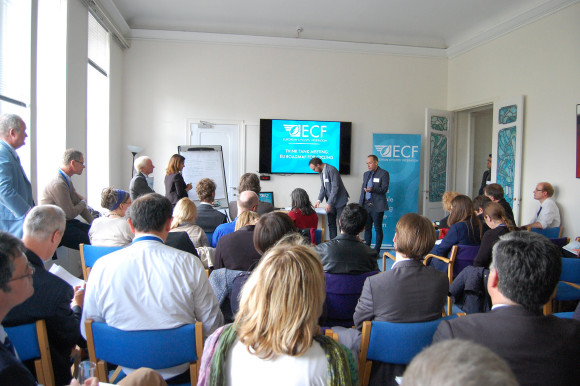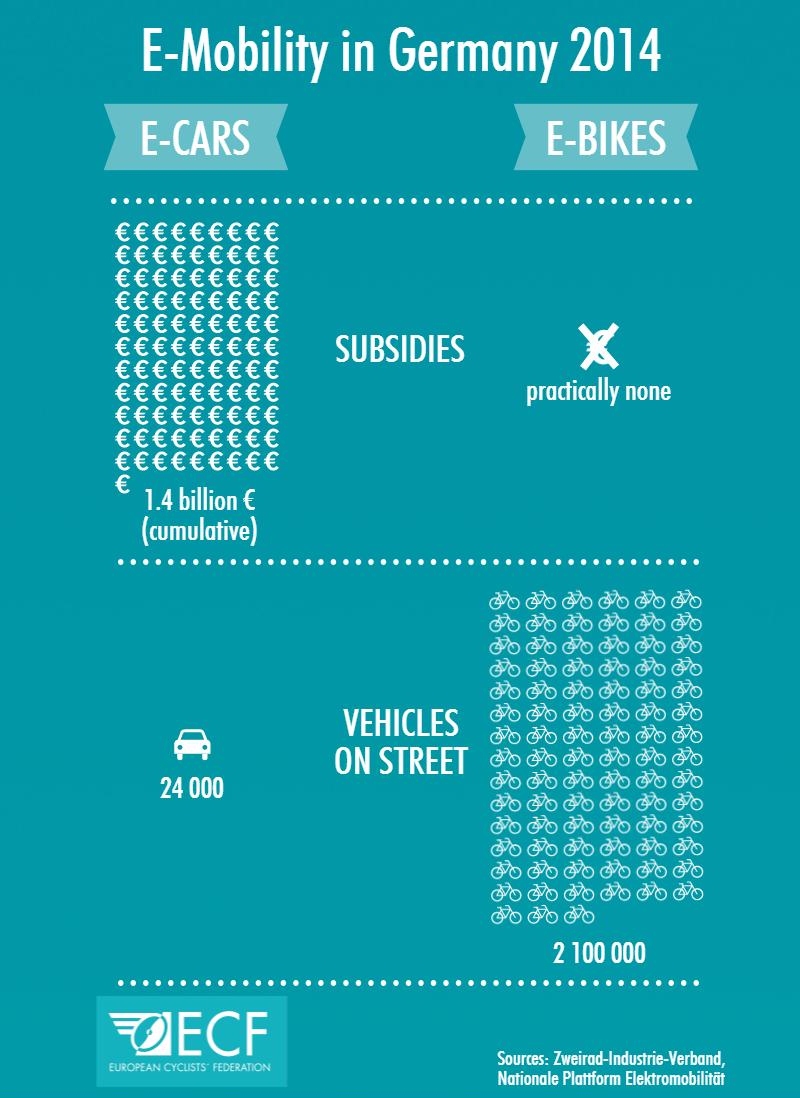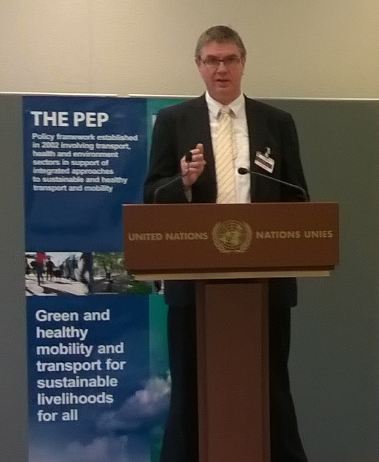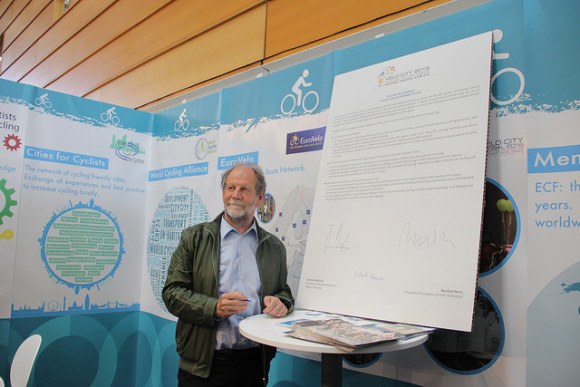
Cycling industry has a place in policy advocacy
Cycling’s reach is remarkable. It transcends numerous policy issues such as transport, infrastructure, taxation, tourism and technical standards, all of which are also relevant for the cycling industry. Advocacy work serves a common interest for all cycling stakeholders: Having cycling integrated into policy-making and unlocking funding for cycling projects and infrastructure benefits both the cyclists and the industry. ECF works tirelessly to put cycling on the policy agenda on international, EU and local level and the industry's involvement is needed if we are to make a larger impact. The Cycling Industry Club has made great progress to make policy-makers aware of the benefits of a flourishing cycling industry. A booming industry gives cycling advocacy many strong arguments, such as job creation, to promote cycling on policy level but advocacy can also support the industry: “We need more support in terms of regulation, data, information and projects to promote bikes and e-bikes”, noted Raymond Gense, Director Future Technology & Public Affairs of PON Holdings, at Velo-city Nantes earlier this month. ECF wants to involve industry in our advocacy work and thanks to the Cycling Industry Club's support our advocacy effort on international, EU and local level are paying off with many concrete results on their way. Together we are bringing the industry into the heart of policy!
Promoting cycling on international level
On international level, ECF sends a message to all international bodies and institutions that cycling delivers not only sustainable, low carbon transport but also jobs, economic growth and health benefits. ECF works directly with the United Nations as their partner in the Transport, Health and Environment Pan-European Programme (THE PEP). This partnership aims to develop a pan-European Master Plan for Cycling Promotion and to support governments in the development of national cycling promotion policies. To promote THE PEP Partnership, ECF and Cycling Industry Club member Accell Suisse took part in a side event organized at the Palais des Nations in Geneva during the 66th session of the United Nation’s Economic Commission for Europe (UNECE) in April this year. The three day side event received a lot of attention and it is an excellent example on how the industry works together ECF on policy advocacy. “We have the honor to enhance and increase the use and the safe design of bicycles, one of the biggest possible contributors to cut CO2 emissions in European cities. Together we can convince the EU and the UN Authorities that a better Europe and a better World will roll on two wheels”, said Moreno Fioravanti, representative of CONEBI and the Accell Group, who also attended the event. You can read more about what happened at the side event here.
Putting cycling on the EU-agenda
On EU level ECF speaks with the top tier decision-makers. Inspired by the THE PEP Partnership, ECF has initiated a European Roadmap for Cycling that helps to define objectives and deploy instruments for cycling promotion in Europe. Last May, ECF launched a think tank which brought together top officials from local and regional authorities, the European Commission, European Parliament, European Council, the World Health Organisation and the cycling industry to put the foundation on a European Roadmap for Cycling. Find our more about the think thank -meeting here.  The momentum for the European Roadmap for Cyling is made especially propitious by upcoming Luxembourgish Presidency of the European Council. The ECF will join an informal meeting of EU transport ministers on October 7th 2015 in Luxembourg. For the first time ever a meeting on this level has been dedicated solely to cycling. This meeting gives us the perfect opportunity to present the Roadmap and encourage individual member states to implement a national cycling strategy based on the THE PEP framework. The role of the CIC has been instrumental in the process. By working together with the CIC, we have been able to demonstrate the role that cycling plays in job creation and in electro-mobility which give powerful incentives to create the Roadmap. ECF's study on jobs and job creation in the cycling economy, that has been put together with the help of the industry, has quickly become one of the cornerstones of ECF’s advocacy work. Audiences are always surprised to learn about the number of jobs linked to cycling. Together we have shown the EU policy world that quality jobs are being created in the cycling industry in Europe. The new Gazelle factory in the Netherlands and the rise of electro-mobility in Germany are good examples of this.
The momentum for the European Roadmap for Cyling is made especially propitious by upcoming Luxembourgish Presidency of the European Council. The ECF will join an informal meeting of EU transport ministers on October 7th 2015 in Luxembourg. For the first time ever a meeting on this level has been dedicated solely to cycling. This meeting gives us the perfect opportunity to present the Roadmap and encourage individual member states to implement a national cycling strategy based on the THE PEP framework. The role of the CIC has been instrumental in the process. By working together with the CIC, we have been able to demonstrate the role that cycling plays in job creation and in electro-mobility which give powerful incentives to create the Roadmap. ECF's study on jobs and job creation in the cycling economy, that has been put together with the help of the industry, has quickly become one of the cornerstones of ECF’s advocacy work. Audiences are always surprised to learn about the number of jobs linked to cycling. Together we have shown the EU policy world that quality jobs are being created in the cycling industry in Europe. The new Gazelle factory in the Netherlands and the rise of electro-mobility in Germany are good examples of this.
Cycling happens at local level
Many concrete decisions that influence cycling, such as investments in cycling infrastructure, are taken on local level. ECF therefore reaches out to city officials and local administration to promote cycling at city level. The Velo-city conference is an excellent forum to reach out to local level decision makers; the conference attracts many city planners, officials and advocates that have the power to make a difference in their own city or region. ECF also has a dedicated network for cities that wish to promote bicycle use in urban areas called Cities for Cyclists.
Network/Project Involved:
- Log in to post comments
Contact the author
Recent news!
Contact Us
Avenue des Arts, 7-8
Postal address: Rue de la Charité, 22
1210 Brussels, Belgium











